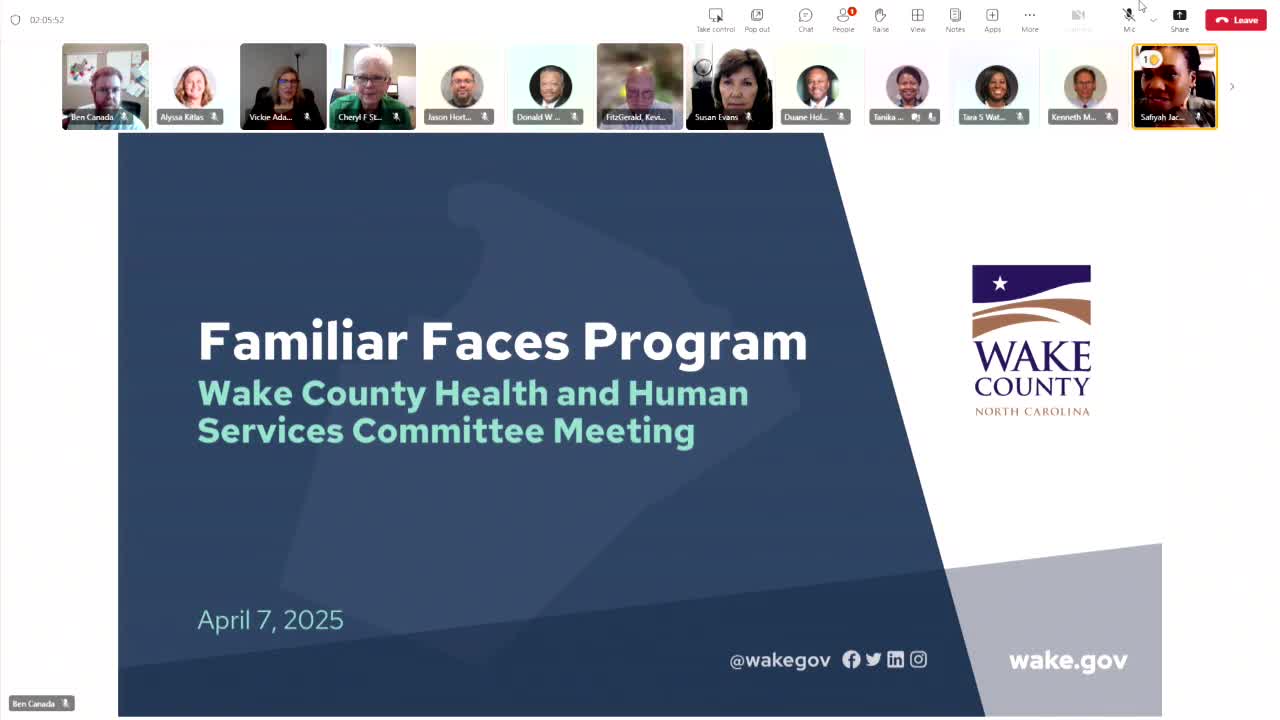Wake County launches Familiar Faces pilot to coordinate care and share data across health, housing and justice systems
Get AI-powered insights, summaries, and transcripts
Subscribe
Summary
The Health & Human Services Committee was briefed April 7 on the Familiar Faces pilot, a Wake County Behavioral Health Department effort to identify people who frequently use emergency and crisis services and connect providers using a shared data platform. Pilot partners include EMS, UNC, WakeMed, Southlight, Triangle Family Services and county
Wake County presented details on April 7 about its Familiar Faces pilot, a county Behavioral Health Department initiative designed to identify people who repeatedly use emergency and crisis services and coordinate care across health, housing and criminal-justice systems using shared data and partner collaboration.
Darryl Lanier, Familiar Faces program manager, said the pilot will combine county and state data sources including the North Carolina Health Information Exchange (HIE), the state criminal-justice data warehouse and the Homeless Management Information System (HMIS) to build unified client profiles. The intent is to give partner agencies timely information that enables care managers, EMS and hospital teams to pursue alternatives to repeated emergency-department use and to enable preventive outreach.
"These are folks that frequently contact crisis services and often face complex medical, behavioral and housing issues," Lanier said. "By sharing data and coordinating services, we intend to take preventative measures so those encounters are reduced and people get integrated whole-person care." Kevin Fitzgerald, a clinical-scholar partner on the project, said earlier analyses showed a small number of people account for a disproportionate share of emergency and justice contacts.
Pilot partners named in the presentation are Wake EMS, UNC Health (including NC FIT and transition clinics), WakeMed, Southlight, Triangle Family Services (a HUD housing-first partner) and the county housing department. Lanier said the program is starting with a limited set of partners to learn and iterate before scaling.
The county described a phased timetable: an interim solution using identity-resolution services already available through the state HIE authority, a discovery phase with a contracted vendor (Tetris Corporation) to design the system, and a goal of a fully operational data-sharing platform by December 2026. Lanier said the county is currently working through required data-sharing agreements and planned presentations to the HIE use-case work group and the HIE advisory committee; the advisory committee consideration is scheduled for June 17.
Lanier emphasized the pilot approach is deliberate: by testing with a small set of partners the county can learn, adjust and avoid large-scale investments that would be difficult to pivot. He also said partners are already coordinating services in advance of full platform deployment to reduce duplication and improve outcomes.
Why it matters: county officials said integrated data and partner collaboration can reduce costly repeated emergency and jail contacts and improve health outcomes for people with complex needs. Lanier and partners said the program could be a model for other counties and, in time, a statewide approach.
Next steps: the county will complete data-sharing agreements, continue the discovery contract with the vendor Tetris Corporation, present the project to the HIE use-case work group and the advisory committee in the coming months, and return to the board later this summer with a multiyear contract request for full implementation.
